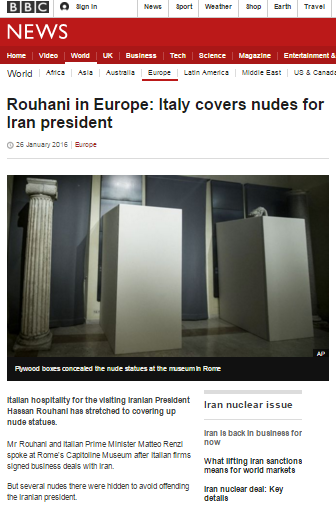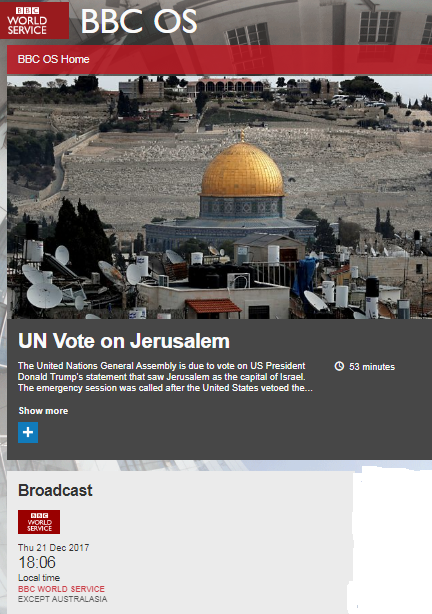Between the evening of November 18th and the evening of November 19th the BBC News website published three written reports, totalling 2,420 words, relating to a statement made by the US Secretary of State.
November 18th 2019: ‘US says Israeli settlements are no longer illegal’
November 19th 2019: ‘US settlement move endorses ‘law of the jungle’ – Palestinians’
November 19th 2019: ‘US settlement move reduces chances of Israeli-Palestinian peace deal’ by Barbara Plett Usher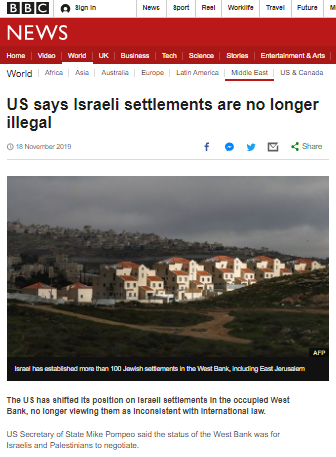
The first article includes – albeit near its end – a reasonable portrayal of the positions held by various US administrations over the years.
“In 1978, the Jimmy Carter administration concluded that the establishment of civilian settlements was inconsistent with international law. In 1981, President Ronald Reagan disagreed with that conclusion, saying he did not believe the settlements were inherently illegal.
Since then, the US adopted a position of describing the settlements as “illegitimate” – though not “illegal” – and sheltering Israel from condemnatory resolutions on the issue at the United Nations.
However one of the last acts of the Obama administration, at the end of 2016, was to break with US practice by not vetoing a UN resolution that urged an end to illegal Israeli settlements.”
The second article opens with the erroneous claim that: [emphasis added]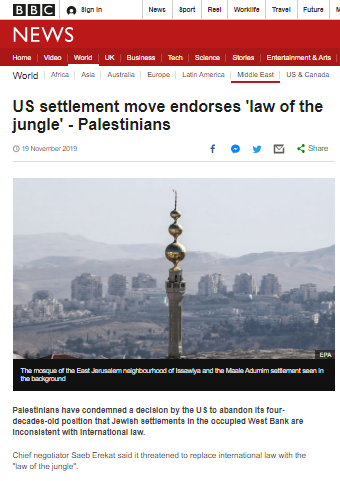
“Palestinians have condemned a decision by the US to abandon its four-decades-old position that Jewish settlements in the occupied West Bank are inconsistent with international law.”
In fact, as explained in the first report and indeed again towards the end of this one, Secretary Pompeo’s statement marks a return to the policy of US administrations between 1981 and December 2016. In other words, the “position” described by the BBC is three years old rather than “four-decades-old”.
The third report by Barbara Plett Usher makes no attempt to inform readers on the issue of the policies of past US administrations.
The first article promotes the BBC’s own standard but partial mantra concerning ‘international law’.
Article 1: “The issue of Jewish settlements is one of the most contentious between Israel and the Palestinians.
About 600,000 Jews live in about 140 settlements built since Israel’s occupation of the West Bank and East Jerusalem. The settlements are widely considered illegal under international law, though Israel has always disputed this.”
In the second article readers are told that:
Article 2: “The UN regards the settlements as being illegal under international law.”
BBC audiences are not informed that UNSC resolution 2334 dating from December 2016 was adopted under the United Nations Charter’s Chapter 6 and is hence non-binding.
The BBC chooses to describe settlements as follows:
Article 1: “Settlements are communities established by Israel on land occupied in the 1967 Middle East war.
They have long been a source of dispute between Israel and the international community, and the Palestinians.”
Article 2: “Settlements are communities established by Israel on land occupied in the 1967 Middle East war. They have long been a source of dispute between Israel and the international community, and the Palestinians.”
Article 3: “Settlements are Jewish communities built on territory occupied by Israel during the 1967 Middle East war.”
As we see, the BBC does not bother to inform its audiences of the background to that war or of the fact that in the case of Judea & Samaria, the same territory was under Jordanian occupation for 19 years. That omission enables Barbara Plett Usher to state that: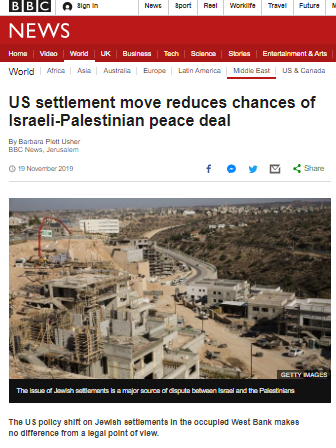
“…Americans do not make international law: that is up to bodies such as the United Nations and treaties such as the Fourth Geneva Convention, which bars an occupying power from transferring parts of its civilian population to occupied territory.”
Only in the second article do readers find any alternative view to the BBC’s standard mantra or reference to events before 1967 and that is presented as something that “Israel says”.
Article 2: “Most of the international community, including the UN and the International Court of Justice, say the settlements are illegal. The basis for this is the 1949 Fourth Geneva Convention which forbids the transfer by an occupying power of its people to occupied territory.
However, Israel says the Fourth Geneva Convention does not apply de jure to the West Bank because, it says, the territory is not technically occupied.
Israel says it is legally there as a result of a defensive war, and did not take control of the West Bank from a legitimate sovereign power. It says the legal right of Jewish settlement there, as recognised by the 1922 League of Nations Mandate for Palestine, was preserved under the UN’s charter.”
Those three paragraphs are taken from a backgrounder originally published in December 2016 and since amended several times to which a link is provided in all three reports. All three reports also promote a map titled “West Bank settlements” sourced from the foreign funded political NGO ‘B’tselem’. As has been the case with previous maps from the same source used by the BBC, this one too portrays places such as Neve Ya’akov and Gush Etzion as ‘settlements’ despite the fact that Jews purchased land and lived in those areas long before they were ethnically cleansed by the invading Jordanian army in 1948.
Part two of this post will review additional aspects of these three BBC reports.
Related Articles:
Quantifying BBC ‘due impartiality’ on ‘international law’
A review of BBC News website coverage of UNSC resolution 2334
BBC Watch prompts amendment to inaccurate BBC map

